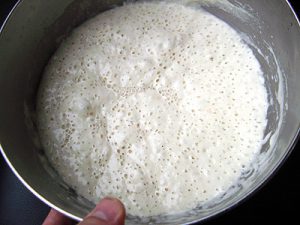Poolish

Those who have out of desire have chosen to or out of dire necessity been forced to bake their own bread may have encountered the term poolish. It refers to a semi-liquid pre-ferment used in bread-making, a mixture of half water and half white flour mixed with a teeny bit of yeast and allowed to slowly ferment for several hours, up to a day, before mixing up the final dough.
The word itself is an exceedingly odd one, and has been the source of much head-scratching and inconclusive speculation among bread-bakers across the world: it looks like the English word Polish, but is spelled funny, and anyway seems to be borrowed from French, where the spelling would be funnier still. Most discussions of the technique include the obligatory etymological digression, usually fantastical, involving journeymen Polish bakers fanning out over Europe. Linguists too have gotten on the trail: David Gold’s Studies in Etymology and Etiology (2009) devotes a whole page to the question, but does not get too far.
In its current form it is technical jargon from French commercial baking, and has probably made its way to a broader public through Raymond Calvel’s influential Le gout du pain (‘The taste of bread’) from 1990. In his account:
This method of breadmaking was first developed in Poland during the 1840s, from whence its name. It was then used in Vienna by Viennese bakers, and it was during this same period that it became known in France. (2001 edition translated by Ronald Wirtz)
This explanation has been widely accepted, and appears in one form or another in any number of bread-baking books. But how could it even be true? The first problem is the word itself. Poolish is not the French word for Polish, and doesn’t much look a French word anyway. In earlier French texts it crops as pouliche, which looks more French and is indeed the word for a young mare, whose connection to bread dough is tenuous at best. But earlier French texts also have the spelling poolisch or polisch, which looks rather more German than French and suggests we follow the Viennese trail instead.
This thread of inquiry has its own potential hiccoughs. The German word for Polish is polnisch, with an [n], so would this not just be fudging things? Actually not: polisch, poolisch, pohlisch or pollisch turn up often enough in older texts as alternative words for ‘Polish’, particularly in southern varieties of German that include Austria. And it is exactly in these form that we find it being used to refer to this particular process, juxtaposed with Dampfl (or Dampfel or Dampel), the term in southern Germany and Austria for a rather stiffer pre-ferment which goes through a shorter rising period, as in these two examples from 1865, one from Leopold Wimmer’s self-published advertising advertising screed for St. Marxer brand (of Vienna) pressed yeast, where it turns up as Pohlisch:
![]()
the other from Ignaz Reich’s (of Pest, as in Budapest) account of ancient Hebrew baking practices, where it’s rendered as pollisch.
![]()
The term polisch (in all its variants) in this sense seems to have died a natural death in German, only to reemerge during the current craft-baking revival in the guise of poolish.
But if poolish was originally the (or a) German word for Polish, we run up against the sticky question of what it was actually referring to. Calvel repeats the story that this technique was invented by Polish bakers (which turns up in a 1972 article in The Atlantic Monthly, I think anyway, because it’s but coyly revealed by Google in snippet view), a supposition which lacks as much plausibility as it does historical attestation. Poland has traditionally been a land of sourdough rye bread. Is seems unlikely that a novel technique involving the use both of white wheat flour and commercial pressed yeast (a relatively new product) would have been devised there and introduced into the imperial capital that was Vienna. So what on earth could it have meant?
 Here I make my own foray into speculation; you read it here first. Poland is not just a land of sourdough rye bread, it is a land of a soup made from rye sourdough: żur or żurek (itself derived from sur, one variant of the German word for ‘sour’), still widely consumed and also sold in ready form form for time-strapped gourmands. Since the Austro-Hungarian Empire included much of what had once been Poland, it isn’t too far-fetched to think that people in Vienna might have been familiar with this soup. And since the salient characteristic of poolish is that it is basically liquid, in opposition to more solid doughs, my guess is that the term poolish arose as a facetious allusion to żur: a soup-like fermenting dough mixture, like the thinned-out sourdough soup that Poles eat.
Here I make my own foray into speculation; you read it here first. Poland is not just a land of sourdough rye bread, it is a land of a soup made from rye sourdough: żur or żurek (itself derived from sur, one variant of the German word for ‘sour’), still widely consumed and also sold in ready form form for time-strapped gourmands. Since the Austro-Hungarian Empire included much of what had once been Poland, it isn’t too far-fetched to think that people in Vienna might have been familiar with this soup. And since the salient characteristic of poolish is that it is basically liquid, in opposition to more solid doughs, my guess is that the term poolish arose as a facetious allusion to żur: a soup-like fermenting dough mixture, like the thinned-out sourdough soup that Poles eat.
This theory has the minor drawback of lacking any positive evidence in its favor. So far the only 19th century reference to żur outside of its normal context that I have been able to find is as a cure for equine distemper, otherwise known as ‘strangles’. That leads us into the topic of pluralia tantum disease names…
3 thoughts on “Poolish”
Recently poolish method bread making has become popular in China, and the Chinese translation is 波兰种 (from Poland). You further explained that how it was related to pre fermentation. It makes a lot of sense to me. Thanks for your research!
I like your speculative explanation better than “the French brought it from Poland and gave it an Old English name”!
(Wandering off into a new rabbit hole as you do at the end is why nothing ever gets done around here.)
My husband has made French bread going on 50 years, both commercially and at home. He has always pronounced it pouliche with the French accent.
As a linguistics student, I would say poolish is Anglesized, and has no similarity to the word Polish.